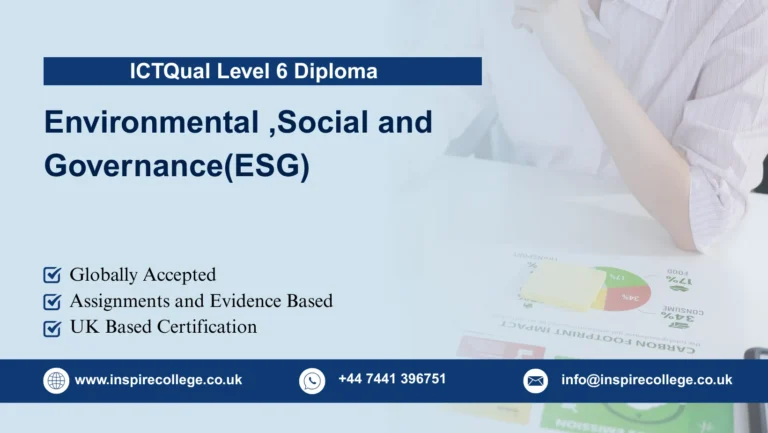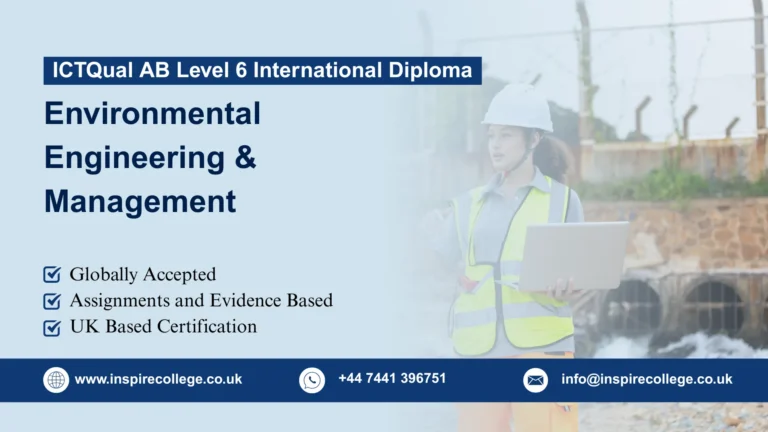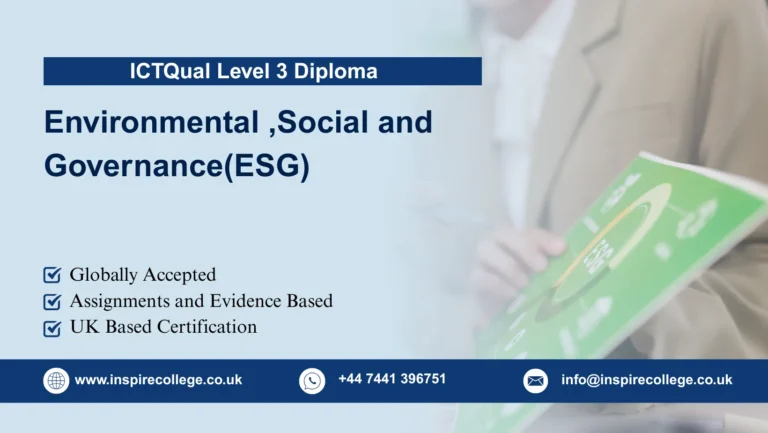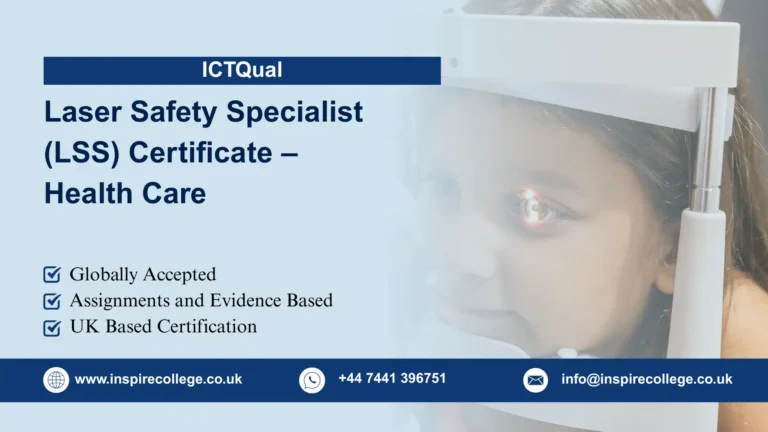
ICTQual AB Level 6 International Diploma in Project Management
Project management is a critical discipline in today’s fast-paced business environment, ensuring that projects are delivered efficiently, on time, and within budget. The ICTQual AB Level 6 International Diploma in Project Management equips learners with advanced knowledge and practical skills required to lead complex projects across diverse industries. This internationally recognized qualification is designed for both freshers and professionals seeking to enhance their expertise in project planning, execution, and control.
The purpose of this diploma is to provide a comprehensive understanding of project management principles, methodologies, and best practices. Learners will gain in-depth knowledge of project life cycles, risk management, resource allocation, budgeting, stakeholder engagement, and quality assurance. Emphasis is placed on practical application through case studies, simulations, research projects, and real-world scenarios, enabling participants to translate theory into actionable strategies.
Over the three-year programme (360 credits), learners will develop essential skills such as strategic planning, decision-making, team leadership, and effective communication. Graduates will be capable of managing projects of varying scale and complexity, applying industry-standard frameworks like PMBOK, PRINCE2, and Agile methodologies, and ensuring compliance with international project management standards.
To ensure learners are fully prepared for the academic rigor and professional demands of the ICTQual AB Level 6 International Diploma in Project Management, applicants must meet specific entry criteria designed to support their success throughout the programme.
- Age Requirement: Learners should typically be 18 years of age or older at the time of enrolment.
- Educational Requirements: A Level 5 qualification or equivalent in Project Management, Business Administration, or a related field is recommended. Applicants with substantial professional experience in project coordination, operations, or business management may also be considered.
- Professional Experience: While prior work experience is not mandatory, candidates with 3–5 years of relevant experience in project management or leadership roles may be eligible for a fast-track or Recognition of Prior Learning (RPL) pathway.
- English Language Proficiency: Strong English proficiency is essential for understanding course materials, effective communication, and completing assessments. Competence may be demonstrated through prior qualifications, standardized tests, or professional experience in English-speaking environments.
- Related Courses: ICTQual AB Level 6 International Diploma in Construction Management and ICTQual AB Level 6 International Diploma in Quality Management.
This ensures that learners are well-prepared to engage with the three-year, 360-credit programme and successfully acquire advanced project management skills and knowledge.
Mandatory Units
This qualification, the ICTQual ABLevel 6 International Diploma in Project Management, consists of 36 mandatory units:
Year 1 – Foundations of Project Management
- Principles of Project Management
- Fundamentals of Organisational Management
- Business Law, Compliance, and Regulatory Frameworks
- Introduction to Project Planning and Scheduling
- Workplace Health, Safety, and Risk Management
- Project Cost Estimation and Budgeting
- Business Communication and Professional Reporting
- Leadership Fundamentals in Project Environments
- Information Technology for Project Management
- Quality Control and Assurance in Projects
- Data Analysis and Research Methods
- Corporate Social Responsibility and Ethical Practices
Year 2 – Applied Project Management Practices
- Advanced Project Planning and Control
- Project Contracts and Procurement Management
- Human Resource Management in Projects
- Risk Management in Project Environments
- Project Financial Management and Economics
- Sustainable Project Management Practices
- Project Resource and Logistics Management
- Stakeholder Management and Communication
- Quality Auditing and Continuous Improvement
- Project Leadership and Team Development
- Applied Case Studies in Project Management
- Applied Research in Project Operations
Year 3 – Advanced Strategic Project Leadership
- Strategic Project Management and Organisational Growth
- Advanced Project Management Theories and Practices
- Digital Project Management and Smart Technologies
- Crisis and Risk Management in Projects
- International Project Management and Policy
- Leadership and Organisational Change in Projects
- Global Project Management Opportunities
- Performance Measurement and Benchmarking
- Ethics, Governance, and Sustainability in Projects
- Innovation and Change Management in Projects
- Advanced Research Methods in Project Management
- Dissertation / Final Research Project
Upon successful completion of the ICTQual AB Level 6 International Diploma in Project Management, learners will acquire advanced knowledge, practical skills, and strategic competencies in project management, preparing them for leadership roles across industries.
Year 1 – Foundations of Project Management
Principles of Project Management
- Understand core project management methodologies and lifecycle phases.
- Apply project planning and scheduling techniques in real-world scenarios.
- Develop skills in defining project objectives, scope, and deliverables.
Fundamentals of Organisational Management
- Analyze organisational structures, functions, and culture in project contexts.
- Develop strategies to align project goals with organisational objectives.
- Apply decision-making models for effective project management.
Business Law, Compliance, and Regulatory Frameworks
- Identify legal requirements and regulatory obligations affecting projects.
- Apply compliance principles to ensure project operations adhere to laws.
- Evaluate the impact of legal and ethical considerations on project outcomes.
Introduction to Project Planning and Scheduling
- Create detailed project plans using tools such as Gantt charts and timelines.
- Allocate resources efficiently and manage project dependencies.
- Monitor progress and adjust schedules to meet deadlines.
Workplace Health, Safety, and Risk Management
- Implement workplace safety protocols and risk mitigation strategies.
- Conduct risk assessments and develop contingency plans.
- Apply health and safety standards to project environments.
Project Cost Estimation and Budgeting
- Calculate project costs, including labor, materials, and overheads.
- Prepare budgets and monitor expenditures against forecasts.
- Apply cost control techniques to maintain financial discipline.
Business Communication and Professional Reporting
- Develop effective written and verbal communication for project stakeholders.
- Prepare professional reports, presentations, and documentation.
- Use communication tools to facilitate team collaboration and reporting.
Leadership Fundamentals in Project Environments
- Demonstrate leadership skills in managing project teams.
- Motivate and guide team members to achieve project goals.
- Resolve conflicts and foster a collaborative project culture.
Information Technology for Project Management
- Utilize project management software and digital tools for planning and monitoring.
- Implement IT solutions to improve project efficiency and reporting.
- Analyze project data to support decision-making.
Quality Control and Assurance in Projects
- Apply quality management principles and standards to project deliverables.
- Conduct inspections, audits, and evaluations to ensure compliance.
- Identify areas for improvement in project quality processes.
Data Analysis and Research Methods
- Collect, analyze, and interpret project-related data.
- Apply statistical tools to support project decisions.
- Conduct research to inform project planning and risk management.
Corporate Social Responsibility and Ethical Practices
- Integrate ethical considerations into project management decisions.
- Implement sustainable and socially responsible project practices.
- Evaluate the impact of projects on communities and stakeholders.
Year 2 – Applied Project Management Practices
Advanced Project Planning and Control
- Develop complex project schedules and resource allocation plans.
- Implement monitoring and control mechanisms for ongoing projects.
- Use project KPIs to track progress and performance.
Project Contracts and Procurement Management
- Understand contract types, procurement processes, and supplier relationships.
- Manage procurement risks and ensure compliance with legal standards.
- Negotiate and manage contracts to achieve project objectives.
Human Resource Management in Projects
- Plan workforce requirements and assign roles effectively.
- Implement team development and performance evaluation strategies.
- Resolve HR challenges within project environments.
Risk Management in Project Environments
- Identify, assess, and prioritize project risks systematically.
- Develop mitigation strategies to minimize potential disruptions.
- Monitor and update risk registers throughout the project lifecycle.
Project Financial Management and Economics
- Monitor project budgets, cash flows, and financial performance.
- Apply cost-benefit and economic analysis to project decisions.
- Ensure financial resources are used efficiently and effectively.
Sustainable Project Management Practices
- Integrate environmental and sustainability considerations into project planning.
- Evaluate project impacts on natural resources and communities.
- Implement practices to minimize environmental footprints.
Project Resource and Logistics Management
- Plan and coordinate material, equipment, and human resources.
- Optimize supply chains and logistics for project efficiency.
- Address resource constraints and scheduling conflicts.
Stakeholder Management and Communication
- Identify key stakeholders and analyse their interests.
- Develop communication strategies to engage stakeholders effectively.
- Manage expectations and maintain positive relationships.
Quality Auditing and Continuous Improvement
- Conduct project audits and evaluate compliance with quality standards.
- Identify areas for process improvements and implement corrective actions.
- Apply continuous improvement frameworks to enhance project outcomes.
Project Leadership and Team Development
- Demonstrate advanced leadership and motivational techniques.
- Build high-performing teams and manage team dynamics.
- Resolve conflicts and foster collaboration in complex projects.
Applied Case Studies in Project Management
- Analyze real-world project scenarios to apply theoretical knowledge.
- Develop problem-solving and decision-making skills.
- Present findings and recommendations to stakeholders.
Applied Research in Project Operations
- Conduct research to support project planning and strategy.
- Use qualitative and quantitative methods for data-driven decisions.
- Apply research findings to improve project performance.
Year 3 – Advanced Strategic Project Leadership
Strategic Project Management and Organisational Growth
- Align project strategy with organisational goals.
- Develop frameworks for long-term project sustainability.
- Evaluate strategic opportunities for organisational growth.
Advanced Project Management Theories and Practices
- Apply contemporary project management models and approaches.
- Evaluate effectiveness of different methodologies in complex projects.
- Adapt theories to real-world project scenarios.
Digital Project Management and Smart Technologies
- Use digital tools and smart technologies for project optimization.
- Implement AI, software, and IoT solutions to enhance project outcomes.
- Monitor technological integration and performance metrics.
Crisis and Risk Management in Projects
- Prepare contingency plans for project crises.
- Mitigate and respond to unforeseen challenges effectively.
- Ensure project continuity under high-risk conditions.
International Project Management and Policy
- Understand international regulations and standards affecting projects.
- Manage cross-border projects and multicultural teams.
- Apply global project policies for compliance and efficiency.
Leadership and Organisational Change in Projects
- Lead organisational change initiatives within project contexts.
- Develop strategies to manage resistance and ensure successful adoption.
- Enhance team performance during transformational projects.
Global Project Management Opportunities
- Identify emerging markets and international project opportunities.
- Evaluate potential projects for profitability and strategic alignment.
- Develop entry strategies for global project initiatives.
Performance Measurement and Benchmarking
- Design KPIs and metrics to evaluate project success.
- Conduct benchmarking against industry best practices.
- Implement improvement initiatives based on performance data.
Ethics, Governance, and Sustainability in Projects
- Apply ethical decision-making frameworks in project environments.
- Ensure projects comply with governance standards.
- Promote sustainable practices across project lifecycles.
Innovation and Change Management in Projects
- Drive innovation and implement change initiatives effectively.
- Apply creative problem-solving to complex project challenges.
- Evaluate outcomes of innovative solutions on project success.
Advanced Research Methods in Project Management
- Conduct comprehensive research to support strategic project decisions.
- Use advanced methodologies for data analysis and reporting.
- Apply research insights to improve project management practices.
Dissertation / Final Research Project
- Design and execute a substantial research project in project management.
- Present findings with critical analysis and professional reporting.
- Demonstrate mastery of knowledge, skills, and strategic competencies in project management.
The ICTQual AB Level 6 International Diploma in Project Management is designed for a diverse range of learners who aim to develop expertise in planning, executing, and leading projects across industries. This course is suitable for both freshers seeking to enter project management and experienced professionals aspiring to enhance their strategic and leadership skills.
- Educational Instructors and Trainers
- Enhance curriculum design and teaching strategies for project management.
- Apply practical project management methodologies in training scenarios.
- Environmental Advocates and Activists
- Develop skills to plan and manage sustainability-focused projects.
- Implement risk assessment and stakeholder engagement in environmental initiatives.
- Students and Recent Graduates
- Acquire foundational knowledge of project management principles and tools.
- Gain practical experience through case studies, assignments, and research projects.
- Career Changers
- Transition into project management roles across various sectors.
- Build leadership, planning, and operational skills relevant to new industries.
- Policy Makers and Regulators
- Understand project governance, compliance, and regulatory frameworks.
- Apply project management best practices to policy implementation and public projects.
This programme ensures that all learners—whether entering the field or advancing their careers—gain internationally recognized competencies in project management. Graduates are fully prepared to lead, innovate, and make strategic decisions in complex project environments, driving organizational success and professional growth.
As an approved ICTQual AB centre, learners must enrol with us to begin their journey toward this globally recognized qualification. There are two routes available depending on the learner’s experience:
1. Route for Experienced Professionals (6+ Years Experience):
- Eligibility: Candidates must demonstrate at least 6 years of verifiable professional experience in project management or related fields.
- Assessment of Competence: Our centre evaluates the candidate’s existing knowledge, skills, and practical experience against the course learning outcomes.
- Evidence Submission: Learners provide professional documentation, including project portfolios, roles, responsibilities, and outcomes.
- Certification: Upon verification of competence, learners are awarded the ICTQual AB Level 6 International Diploma in Project Management without completing the full 36-unit programme.
2. Route for Fresh or Less Experienced Learners:
- Admission: Learners enrol at our approved centre and meet the entry requirements.
- Training: Learners complete the full three-year programme (36 assignments) covering all core, applied, and advanced project management units.
- Assessment: Assignments, case studies, practical exercises, and projects are completed to demonstrate knowledge, skills, and practical application.
- Certification: After successful completion of all assessments and units, learners are awarded the ICTQual AB Level 6 International Diploma in Project Management.
Both routes ensure that learners—whether experienced professionals or newcomers—can achieve this internationally recognized qualification and enhance their career prospects in project management, leadership, and strategic business operations.
Register Now
FAQs for ICTQual AB Level 6 International Diploma in Project Management






